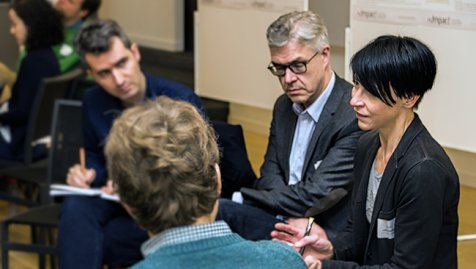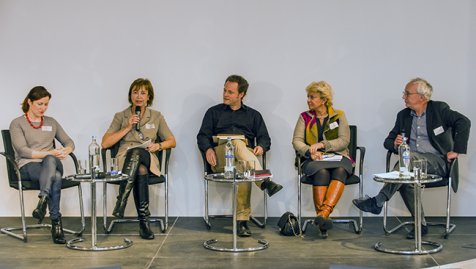Boosting SI’s Social and Economic Impact
SIMPACT Final Conference in Brussels
Pressemitteilung vom 02.12.2016
Redaktion:
Marco Baron
Gelsenkirchen, December 02, 2016: Marking the end of the project, the SIMPACT Final Conference and 1st SI European Policy Forum took place in Brussels November 22nd to 23rd, 2016. A lively discussion among social innovators, policymakers, researchers and other social innovation stakeholders made the conference a successful event and mirrored the relevance and interest in accelerating social innovations’ social and economic impact.
Building on three years of research, stakeholder engagement and innovative thinking, the SIMPACT team invited social innovators, policymakers, intermediaries and other social innovation stake-holders to share its insights as well as the practical tools developed.
The highly interactive «Social Innovation Policy Forum» led by Peter Totterdill, Rosemary Exton and Peter Cressy (University of Bath) explored ways in which new and more inclusive forms of public policymaking are enhancing social innovation. A small but growing number of European public en-tities are breaking with traditional, bureaucratic approaches to procurement and regulation to re-lease the innovative potential of cross-boundary collaboration and power-sharing between the pub-lic, private and third sectors as well as communities and citizens. In such cases, public sector staff are encouraged and empowered to work with external partners in forging creative solutions to previously intractable social and economic problems based on shared vision, a long-term horizon and, critically, on building intangible assets such as trust, shared governance and sustainability. The lively discussion helped to identify «what works» in designing a future social innovation framework for Europe.

SIMPACT’s findings clearly indicate that social innovation will only realise its potential contribution to inclusive growth to the extent it can maximise its social and economic impact for society. Accordingly, the second day was dedicated to sustainable social innovation business models, measurement of social innovation, spread and growth as well as modelling and scenario building. Following the opening of the conference by project coordinator Judith Terstriep (Institute for Work and Technology) who presented SIMPACT’s core findings, Marianne Paasi (European Commission, DG Research and Innovation) held a welcoming address. Marianne Paasi, who accompanied SIMPACT during the past three years, emphasised the role of social innovation in achieving the Europe’s goal for inclusive growth.
In her inspiring keynote Elke den Ouden (TU/e Fellow at Eindhoven University of Technology) pointed out that designing meaningful innovations that improve quality of life, engage end-users, and provide value for organisations and other stake-holders requires a holistic view to integrate seemingly conflicting needs and requirements into compelling solutions. Based on her work experience at Philips and various collaborative innovation projects, she emphasised the role of open innovation approaches to bridge social and technological innovation for the benefit of organisations and society.
The subsequent three parallel session critically reflected on SIMPACT’s findings:
Based on examples from SIMPACT Business Cases Studies presented by Francesca Rizzo and Ales-sandro Deserti (Politecnico di Milano) the parallel session on «Sustainable Social Innovation Business Models» explored distinct business models that social innovations use to tackle their social mission while maintaining their economic sustainability. The inspiring debate confirmed SIMPACT’s main findings and opened interesting avenues for the integration of the results in current practices and future research.
In the parallel session on «Measuring Social Innovation» René Wintjes (UM Merit), Javier Castro Spila (sinnergiak) and Saeed Moghadam Saman (CIS) in a joint exercise with the participants applied the ex ante impact assessment and indicators to a hypothetical case of social innovation in the field of migration. The exercise reinforced the usefulness of SIMPACT tools and approaches, while stressing the importance of fine tuning and adapting these to the specific fields of social innovation.
The parallel session on «The Spread and Growth of Social Innovation» stimulated a wide-ranging discussion covering the often contradictory roles of policymakers, social innovators and other stake-holders. Capturing and sharing knowledge, experience and skills at national and European levels was identified as a priority for researchers and practitioners alike. However research also needs to maintain a critical perspective, questioning the political values, power relations and choices that underpin instances of social innovation.

Looking further into the future, moderated by Dieter Rehfeld (Institute for Work and Technology) Agnes Hubert (Agnes Hubert (PRESAGE Science Po Paris), Vera Babisova (A-GIGA s.r.o.), Zane Bojare (LUDE, Latvia) and Rafael Ziegler (University Greifswald, CrESSI project) discussed the necessities to unfold the full social and economic impact of social innovation.
Vera Babisova is owner and executive director of A-GIGA a commercial enterprise located in Prague that supports the employability and social rehabilitation of offenders from their time in prison to release and re-socialisation. Vera emphasised the role of trust and the need for business and management capacities. «Starting as a commercial business which than engaged in social innovation assured we have the necessary capacities and management skills to run a sustainable business», she said.
This was confirmed by Zane Bojare who runs the Riga-based social enterprise LUDE, a weaving studio that employs senior ladies and utilises textile waste to create design rugs. In addition, she emphasised that instead of waiting for policymakers to set an appropriate framework, social innovators should step forward and act irrespective the availability of public funding. «While public funding can help establishing the business, it can also create ‘greenhouse settings’ and endanger sustainability of the company», she continued.
In his closing keynote Alfred Kleinknecht (Emeritus Professor of Economics) addressed the question whether Europe has any chance for inclusive growth against the background of a tough productivity crisis. He argued that one of the causes of the productivity crisis is the deregulation of labor markets through structural reforms that impede the working of the Schumpeter II innovation model. «By definition value added per working hour … is equal to National Income» and «hence, with low labour productivity growth, there is little to be (extra) distributed between labour, capital and the public sector», he claimed. This puts pressure on public budgets including the welfare systems and increases the chance of creating a class of 'working poor'.
For further information on SIMPACT and its out-comes in terms of reports, working papers, statistics briefs, and tools please visit www.simpact-project.eu.
